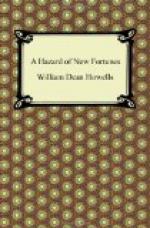He was walking over toward the West Side, aimlessly at first, and then at times with the longing to do something to save those mistaken men from themselves forming itself into a purpose. Was not that what she meant when she bewailed her woman’s helplessness? She must have wished him to try if he, being a man, could not do something; or if she did not, still he would try, and if she heard of it she would recall what she had said and would be glad he had understood her so. Thinking of her pleasure in what he was going to do, he forgot almost what it was; but when he came to a street-car track he remembered it, and looked up and down to see if there were any turbulent gathering of men whom he might mingle with and help to keep from violence. He saw none anywhere; and then suddenly, as if at the same moment, for in his exalted mood all events had a dream-like simultaneity, he stood at the corner of an avenue, and in the middle of it, a little way off, was a street-car, and around the car a tumult of shouting, cursing, struggling men. The driver was lashing his horses forward, and a policeman was at their heads, with the conductor, pulling them; stones, clubs, brickbats hailed upon the car, the horses, the men trying to move them. The mob closed upon them in a body, and then a patrol-wagon whirled up from the other side, and a squad of policemen leaped out and began to club the rioters. Conrad could see how they struck them under the rims of their hats; the blows on their skulls sounded as if they had fallen on stone; the rioters ran in all directions.
One of the officers rushed up toward the corner where Conrad stood, and then he saw at his side a tall, old man, with a long, white beard, who was calling out at the policemen: “Ah, yes! Glup the strikerss—gif it to them! Why don’t you co and glup the bresidents that insoalt your lawss, and gick your Boart of Arpidration out-of-toors? Glup the strikerss—they cot no friendts! They cot no money to pribe you, to dreat you!”
The officer lifted his club, and the old man threw his left arm up to shield his head. Conrad recognized Zindau, and now he saw the empty sleeve dangle in the air over the stump of his wrist. He heard a shot in that turmoil beside the car, and something seemed to strike him in the breast. He was going to say to the policeman: “Don’t strike him! He’s an old soldier! You see he has no hand!” but he could not speak, he could not move his tongue. The policeman stood there; he saw his face: it was not bad, not cruel; it was like the face of a statue, fixed, perdurable—a mere image of irresponsible and involuntary authority. Then Conrad fell forward, pierced through the heart by that shot fired from the car.
March heard the shot as he scrambled out of his car, and at the same moment he saw Lindau drop under the club of the policeman, who left him where he fell and joined the rest of the squad in pursuing the rioters. The fighting round the car in the avenue ceased; the driver whipped his horses into a gallop, and the place was left empty.




